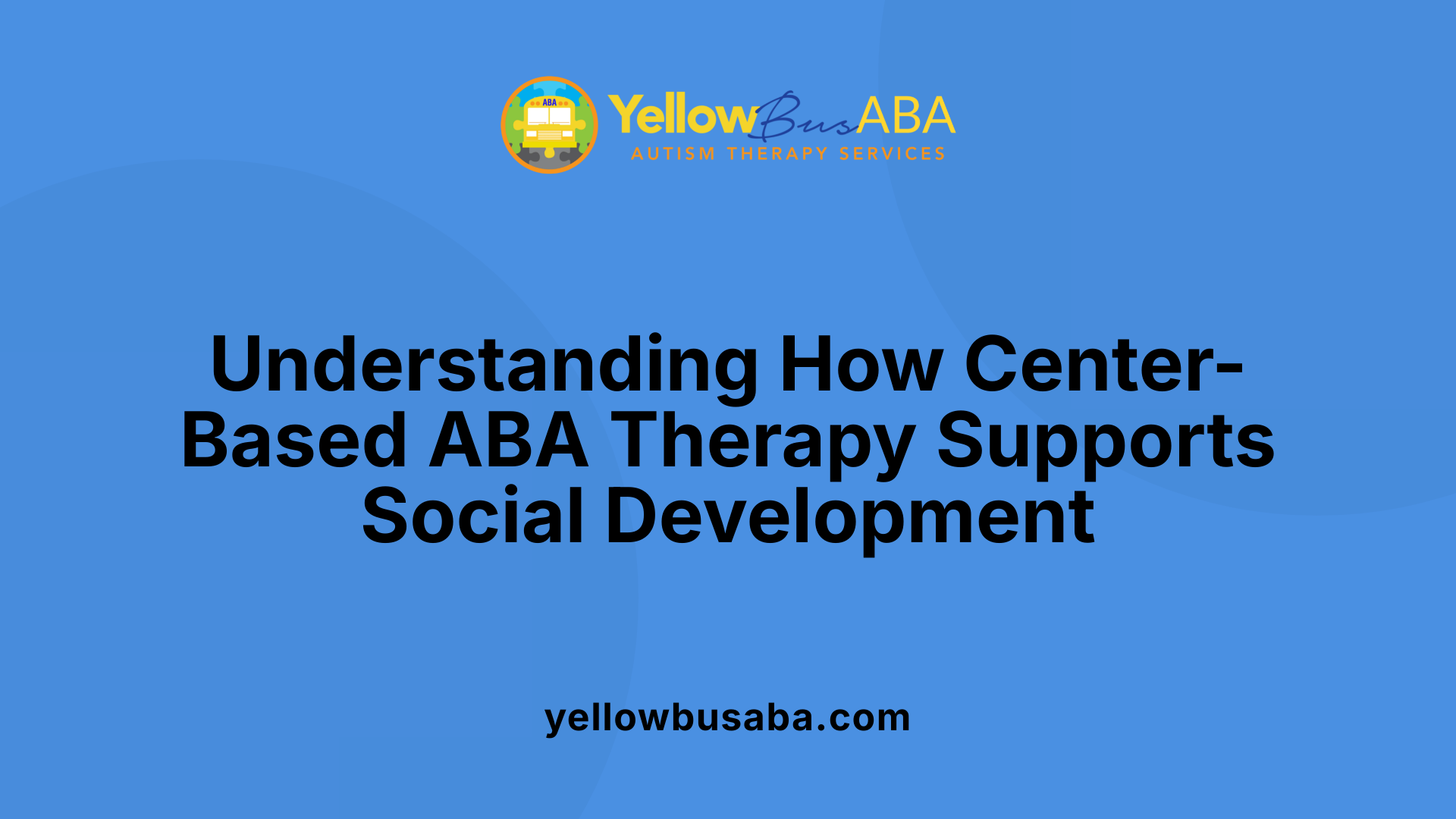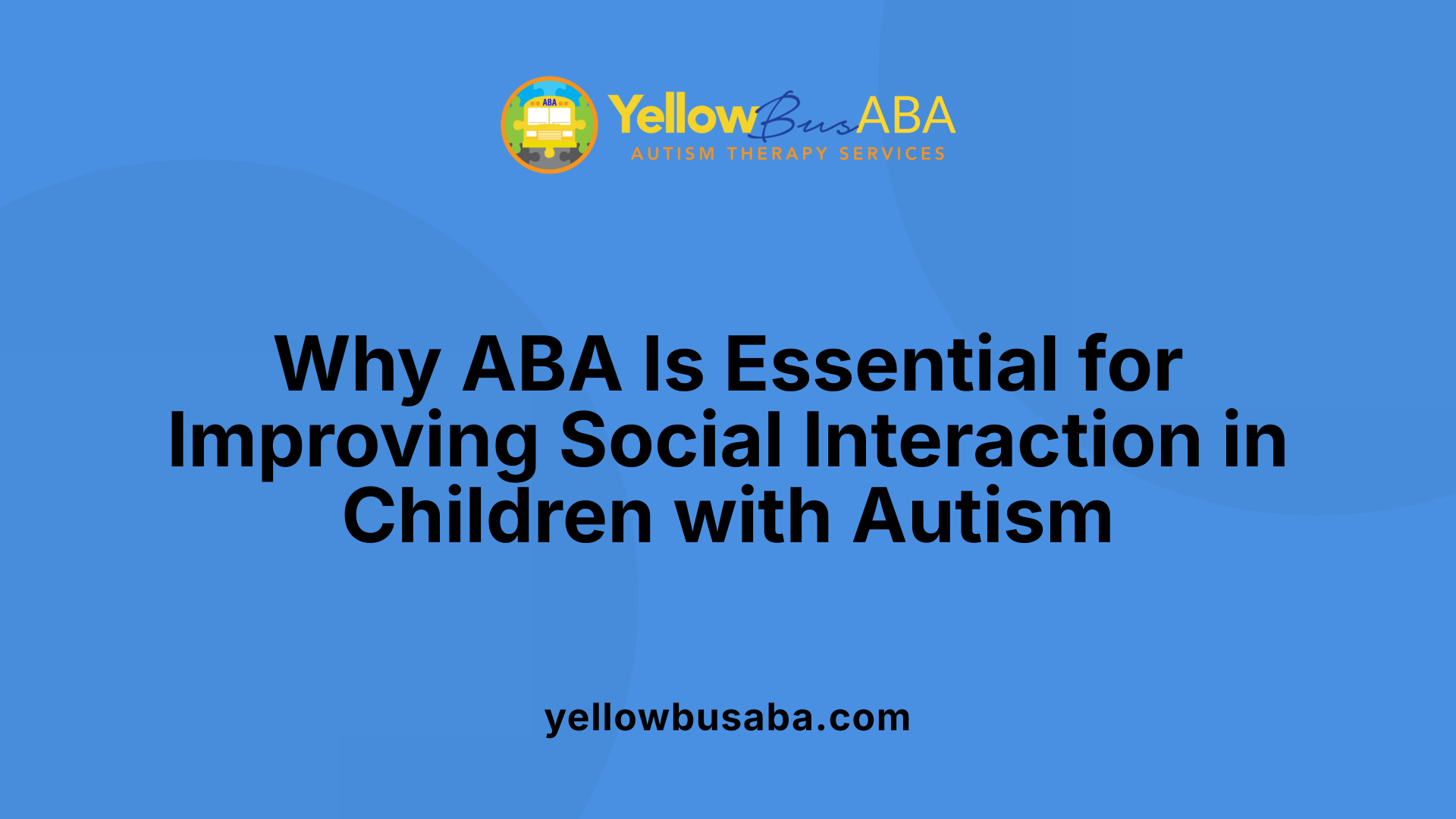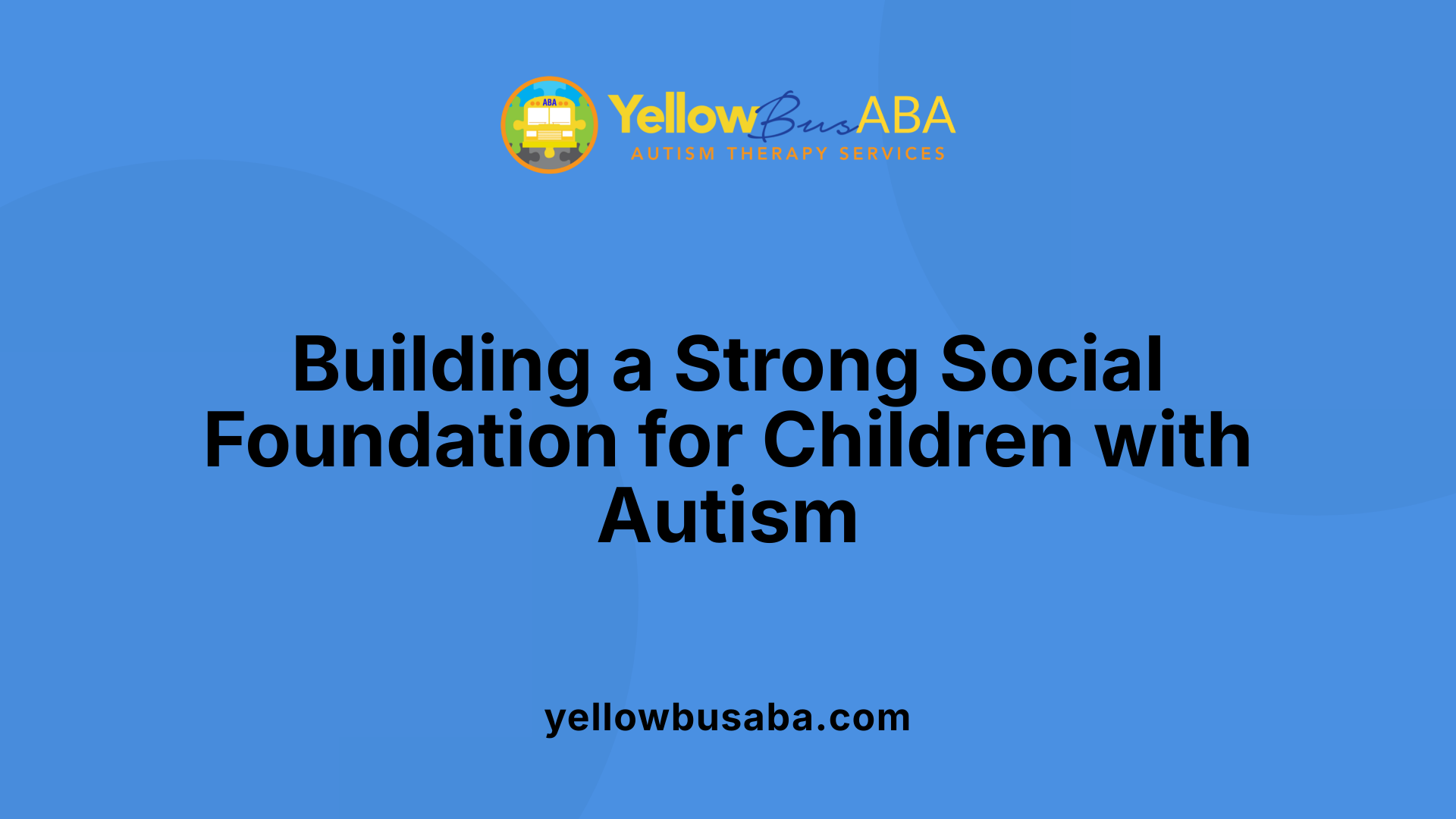Unlocking Social Potential with Center-Based ABA Therapy
Center-based Applied Behavior Analysis (ABA) therapy offers a structured, supportive environment designed specifically to enhance social skills such as turn-taking and sharing among children with autism. This comprehensive approach combines evidence-based techniques with a multidisciplinary team to foster meaningful progress in communication, social interaction, and independence.
Understanding Center-Based ABA Therapy and Its Implementation

What is center-based ABA therapy and how is it implemented?
Center-based ABA (Applied Behavior Analysis) therapy is a specialized treatment model conducted in dedicated clinical facilities tailored for children with autism spectrum disorder (ASD). It involves a structured environment where trained professionals, including behavior analysts, therapists, and specialists, work closely with each child to develop essential skills and reduce challenging behaviors.
The therapy centers are carefully designed to foster predictability and consistency, which are crucial for children with autism. The environment offers a variety of resources and activities aimed at promoting social interaction, communication, and daily life skills. Techniques such as Discrete Trial Training (DTT), Natural Environment Teaching (NET), and Pivotal Response Treatment (PRT) are commonly used to teach and reinforce desired behaviors.
Professionals begin by conducting thorough assessments to understand each child's specific needs, strengths, and challenges. These evaluations allow them to create individualized treatment plans that target areas like communication, social skills, emotional regulation, motor skills, and managing unwanted behaviors.
Implementing this therapy involves regular sessions where therapists use positive reinforcement and naturalistic teaching methods to encourage skill acquisition. Data collection is an ongoing process, enabling the team to track progress meticulously and adapt interventions as necessary. This continuous monitoring ensures that the therapy remains effective and responsive to the child's development.
Parents are encouraged to participate actively through weekly meetings, progress reports, and training sessions. This involvement ensures that therapeutic strategies are reinforced at home, facilitating generalization of skills across different settings.
Additionally, collaboration with a multidisciplinary team, which may include speech therapists, occupational therapists, educators, and medical professionals, helps provide comprehensive support. The integration of various expertise ensures that intervention strategies align and promote overall growth in the child.
In summary, center-based ABA therapy is a structured, evidence-based approach that combines professional expertise with a supportive environment to help children with ASD develop crucial life skills, improve communication, and increase independence.
Techniques and Strategies to Teach Turn-Taking and Sharing

What techniques and strategies are used in ABA therapy to teach social skills such as turn-taking and sharing?
Applied Behavior Analysis (ABA) therapy utilizes a wide array of methods to teach crucial social behaviors like turn-taking and sharing. These techniques are designed to make learning manageable and engaging for children with autism.
One common approach is Discrete Trial Training (DTT), which involves breaking down complex social skills into smaller, more manageable steps. Children practice these steps repeatedly in a structured setting, with reinforcement provided for successful attempts. This repetition helps solidify behaviors such as sharing and taking turns.
Natural Environment Teaching (NET) is another core strategy. It encourages children to apply their skills in real-life, everyday situations, increasing the likelihood that behaviors like sharing will generalize across settings and people.
Visual supports, including picture cards or social stories, are often used to help children understand expectations. Video modeling can also be employed, where children watch videos demonstrating appropriate behaviors before practicing themselves.
Role-playing activities simulate social interactions in a safe environment, allowing children to practice skills like sharing and taking turns with guidance and feedback.
Social scripts are personalized cues, phrases, or prompts that guide children through specific interactions. They serve as a predictable framework, reducing anxiety and improving execution.
Reinforcement techniques are fundamental; positive reinforcement, such as praise or tokens, encourages children to repeat desired behaviors.
Behavior Skills Training (BST) combines instruction, modeling, rehearsal, and feedback to systematically teach skills. It ensures that children learn and practice social behaviors with ongoing support.
Finally, interventions are tailored to each child's needs through individualized goals. Social scripts and specific strategies are designed to meet their unique developmental profiles, promoting meaningful participation and social inclusion.
How are structured and naturalistic teaching strategies integrated?
In ABA therapy, a balance between structured and naturalistic approaches optimizes learning. Structured sessions, like DTT, provide a clear framework for acquiring specific skills such as turn-taking. These are often used initially to establish foundational behaviors.
Naturalistic strategies, including NET and incidental teaching, prioritize spontaneous interactions and the child's interests. This integration encourages children to practice social skills in less rigid, more engaging contexts, fostering generalization.
How are visual supports, role-playing, social stories, reinforcement, and social scripts used?
Visual supports serve as helpful reminders and visual cues for expected behaviors. Role-playing provides hands-on practice in a controlled setting, simulating real-world interactions.
Social stories narrate social situations, illustrating appropriate responses and prompting understanding.
Reinforcement, particularly positive reinforcement, motivates children to engage in sharing and turn-taking.
Social scripts serve as verbal or visual prompts, helping children navigate social exchanges confidently. These tools work together to create a comprehensive learning environment tailored to individual needs.
Why are individualized goals important for teaching social skills?
Every child has a unique developmental profile and learning pace. Individualized goals ensure that interventions are aligned with each child's specific needs, strengths, and challenges.
By setting personalized objectives related to turn-taking and sharing, therapists can monitor progress more effectively and adjust strategies as needed.
This tailored approach increases the likelihood of meaningful skill acquisition, promotes social integration, and enhances overall communication abilities.
| Technique/Strategy | Description | Purpose |
|---|---|---|
| Discrete Trial Training (DTT) | Structured, repetitive practice with reinforcement | To teach and strengthen specific social behaviors |
| Natural Environment Teaching (NET) | Practice in real-life contexts | To promote generalization and spontaneous use of skills |
| Visual Supports | Pictures, social stories, video modeling | To aid comprehension and cue appropriate behaviors |
| Role-Playing | Simulated scenarios for behavior rehearsal | To develop confidence and practical skills |
| Social Scripts | Phrases or prompts for social interactions | To provide predictable frameworks for children |
| Reinforcement | Praise or tangible rewards for desired actions | To increase likelihood of behaviors being repeated |
| Behavior Skills Training (BST) | Instruction, modeling, rehearsal, feedback | To systematically teach social behaviors |
Implementing these strategies in a comprehensive, individualized plan helps children with autism develop essential social skills, including turn-taking and sharing, setting foundations for improved communication and social participation.
Benefits of Center-Based ABA Therapy for Social Skill Development

What are the benefits of center-based ABA therapy for developing social skills?
Center-based ABA therapy provides a structured environment that is crucial for children with autism to develop essential social skills. Within this setting, children engage in consistent, individualized lessons aimed at improving key social behaviors like sharing, turn-taking, and effective communication.
One of the significant advantages is the availability of trained professionals, including Board Certified Behavior Analysts (BCBAs) and Registered Behavior Technicians (RBTs). These experts employ evidence-based strategies such as role-playing, positive reinforcement, and natural environment teaching. This tailored approach helps children acquire new skills and confidently apply them in different settings.
Interaction with peers during group activities offers real-world social experiences. Participating in games, collaborative tasks, and play groups allows children to practice social behaviors, boosting their confidence and social competence.
The center environment also provides access to various resources and therapeutic tools that support holistic development. Activities might include structured social skills training, emotional regulation strategies, and motor skills development, all integrated into play-based learning.
Moreover, the natural setting of these centers helps children generalize learned skills beyond therapy sessions. Regular practice in a social context enhances their ability to transfer these behaviors to school, home, and community environments.
Parents are an integral part of the process, often participating in weekly meetings, receiving progress updates, and obtaining training to reinforce skills at home. Such involvement ensures consistency and promotes the generalization of skills.
Overall, center-based ABA therapy offers an optimal environment—predictable, resource-rich, and supportive—that accelerates social development, building a foundation for independence, confidence, and lifelong social success.
Effectiveness of ABA in Teaching Social Skills

How effective is ABA therapy in teaching social skills such as turn-taking and sharing to children with autism?
Research evidence underscores that ABA (Applied Behavior Analysis) therapy is remarkably effective in teaching social skills like turn-taking and sharing to children with autism. Numerous studies, including meta-analyses, have demonstrated consistent improvements in these skills among children undergoing ABA intervention.
The therapy employs evidence-based strategies such as positive reinforcement, role-playing, and activity adaptation. These methods help children practice and generalize social behaviors in both structured and natural environments. Extended, often intensive, programs ensure that children receive sufficient exposure and practice, leading to significant behavioral gains.
Empirical data reveal large effect sizes in social skills development, reflecting meaningful improvements that translate into better communication, increased social engagement, and enhanced emotional regulation. Children learn to wait their turn in conversational exchanges, share toys and materials, and respond appropriately in group settings.
The success of ABA in this domain is also supported by real-world outcomes from case studies and clinical reports. Children participating in ABA programs tend to display greater confidence and independence during social interactions. Importantly, these skills are not only acquired but are retained and applied across different contexts, thus helping children participate more fully in daily activities and community life.
Overall, ABA stands as a highly validated approach that can foster crucial social skills in children with autism, paving the way for improved peer relationships, enhanced communication, and greater social inclusion.
The Importance of ABA in Enhancing Social Interaction in Children with Autism

Why is ABA therapy important for improving social interaction skills in children with autism?
ABA (Applied Behavior Analysis) therapy plays a vital role in helping children with autism develop social skills necessary for meaningful interactions. This structured, evidence-based approach employs customized strategies tailored to each child's unique needs. Through methods like role-playing, positive reinforcement, and activity adaptations, ABA effectively teaches social behaviors such as turn-taking, sharing, making eye contact, and responding appropriately in social settings.
One of the main strengths of ABA is its ability to target specific social goals. For example, a child may be encouraged to wait patiently for their turn during a game or to share toys during play. Reinforcing these behaviors encourages children to repeat them, gradually building their social repertoire.
ABA sessions often include engaging, naturalistic activities like board games, group work, or storytelling. These activities provide fun, interactive opportunities for children to practice social skills in realistic contexts. By consistently practicing these behaviors, children gain confidence and feel more comfortable participating in social situations.
A core component of ABA is promoting communication, which is fundamental for social interaction. Enhancing expressive and receptive language helps children articulate their needs, understand others, and engage more effectively. As children gain better communication skills, they naturally develop stronger peer relationships.
Moreover, ABA supports emotional regulation and social understanding. Interventions include teaching children how to recognize emotions, respond appropriately, and manage their own feelings. This holistic approach not only improves social behaviors but also helps children grow in confidence and independence.
The structured environment of ABA therapy helps in the consistency and predictability needed for children with autism. This environment allows for repeated exposure to social behaviors, aiding in their generalization across different settings such as home, school, and community.
Families are actively involved in ABA programs, receiving training and resources to reinforce skills outside therapy sessions. Collaborations with educators and healthcare providers further ensure a cohesive developmental approach.
How does ABA intervention foster social skills development?
| Technique | Description | Example | Benefits |
|---|---|---|---|
| Role-Playing | Children practice social scenarios in a controlled setting | Greeting peers, sharing toys | Builds confidence and prepares children for real-world interactions |
| Reinforcement Techniques | Positive feedback and rewards to encourage desired behaviors | Praise after sharing or taking turns | Increases frequency of positive social behaviors |
| Activity Adaptation | Adjusting activities to match the child's skill level and interests | Simplified game rules for younger children | Enhances engagement and success in social activities |
| Natural Environment Teaching | Teaching in real-life settings, often during regular daily routines | Practicing greetings during snack time | Facilitates generalization of social skills to various settings |
How does ABA help develop confidence and independence?
By building a child's social skills, ABA therapy naturally boosts their confidence in social settings. When children experience success in interactions—such as sharing, turn-taking, or greeting others—they develop a sense of accomplishment. This sense of mastery encourages them to participate more actively and independently.
Furthermore, ABA programs focus on emotional regulation strategies. Teaching children to understand and control their feelings reduces frustration and anxiety, fostering greater independence. As children become more comfortable communicating and playing with peers, they tend to require less adult intervention, leading to increased independence.
How does ABA promote peer relationships and social inclusion?
Center-based ABA therapy provides ample opportunities for children to engage with peers in a supportive environment. Regular group activities and collaborative games promote social interaction, sharing, and turn-taking. These experiences help children learn accepted social norms and develop friendships.
The structured setting ensures consistency and safety, which are crucial for children with autism to thrive socially. Practicing social behaviors in this environment increases the likelihood of children generalizing these skills to other contexts, such as school playgrounds or community settings.
Family involvement is also essential. Families learn strategies to support their child's social development at home, reinforcing skills learned in therapy. This combined effort nurtures inclusion and helps children build meaningful peer relationships.
How does ABA support the generalization of social skills across different environments?
A significant goal of ABA is to ensure that social skills learned in therapy are reflected in everyday life. Naturalistic teaching methods and community-based activities help children transfer skills from the therapy setting to home, school, and community.
Therapists collaborate with educators, caregivers, and medical professionals to ensure consistent reinforcement across environments. Regular progress updates and family training sessions empower caregivers to support ongoing social skill development.
Additionally, the structured routines and visual supports used in center-based ABA create predictable contexts that reduce sensory overload and anxiety, making it easier for children to practice and generalize social behaviors.
| Benefits of Center-Based ABA | Description | How It Helps Develop Social Skills | Additional Support |
|---|---|---|---|
| Consistent Environment | Structured and predictable setting | Reduces anxiety; promotes skill acquisition | Includes a multidisciplinary team -- BCBA, RBTs, speech, occupational therapists |
| Access to Resources | Specialized tools and activities | Enhances engagement and learning | Allows for intensive and tailored therapies |
| Peer Interaction Opportunities | Regular group and play activities | Develops sharing, turn-taking, social norms | Facilitates generalization to wider social contexts |
| Family and Community Involvement | Regular updates and training for families | Reinforces skills learned in therapy | Ensures skills are maintained and generalized |
What is the role of a multidisciplinary team in ABA?
A comprehensive ABA program involves a team of professionals dedicated to the child's overall growth. Behavior analysts (BCBAs), Registered Behavior Technicians (RBTs), speech therapists, occupational therapists, and educators work collaboratively. Each contributes specialized expertise to develop individualized treatment plans.
This teamwork ensures that social development goals are integrated with other developmental areas, creating a holistic approach to therapy. Regular meetings and shared progress data help in adjusting strategies and optimizing outcomes.
In summary, ABA therapy provides a structured, engaging, and individualized pathway for children with autism to master essential social skills. It fosters confidence, encourages peer relationships, and promotes the consistent application of behaviors across environments, leading to improved social inclusion and lifelong benefits.
Enhancing Social Skills through Parental and Community Involvement

Family Engagement Strategies
Family involvement plays a crucial role in reinforcing social skills such as turn-taking and sharing learned during center-based ABA therapy. Families are encouraged to participate actively in their child's progress through regular meetings, progress updates, and hands-on training provided by professionals.
These strategies help ensure consistency between therapy sessions and home or community settings. For example, parents can incorporate turn-taking games and social stories into daily routines, creating natural opportunities for children to practice their skills.
Training and Support for Parents
To empower families, Blossom Children's Center offers specialized training sessions focused on social skill development. Parents learn techniques like positive reinforcement, prompting, and behavior modeling tailored to their child's needs.
Support groups and educational workshops further facilitate peer sharing and problem-solving. This ongoing support helps parents feel confident in applying therapeutic strategies outside clinical environments.
Incorporating Skills at Home and in Community Settings
Children benefit from practicing social skills in various contexts. Families are guided to integrate turn-taking and sharing activities during daily routines, such as mealtime, shopping, and playdates.
Community involvement, like participation in local sports, community groups, or extracurricular activities, provides real-world opportunities for children to generalize these skills. Such activities also promote social engagement and community integration.
Holistic, Ongoing Support Approaches
Effective social skill development is continuous and comprehensive. Blossom Children's Center emphasizes a holistic approach that combines therapy, family involvement, and community participation.
This includes emotional regulation strategies, communication techniques, and social problem-solving skills. The goal is to foster independence and confidence across various environments.
Collaboration with Educational and Medical Professionals
Interdisciplinary collaboration enhances the effectiveness of social skills training. Therapists at Blossom regularly communicate with teachers, speech therapists, occupational therapists, and medical providers.
This coordinated effort ensures that strategies are consistent, goals are aligned, and progress is maximized. It also facilitates the smooth transition of skills learned in therapy to school and community settings.
| Aspect | Focus Area | Implementation | Benefits |
|---|---|---|---|
| Family Involvement | Parent training, routines | Workshops, daily practice | Reinforces skills, increases consistency |
| Community Participation | Group activities, sports | Local clubs, community events | Generalizes skills, builds confidence |
| Support Services | Multidisciplinary collaboration | Combined therapy planning, progress sharing | Accelerates development, ensures holistic growth |
| Home Integration | Daily routines, play | Turn-taking games, sharing chores | Creates natural practice environments |
| Continuous Support | Ongoing evaluation | Regular assessments, parent feedback | Tracks progress, adapts strategies |
By combining targeted therapy, active family participation, and community engagement, children gain more opportunities to develop and refine their social skills. This comprehensive approach aims to nurture confident, socially adept individuals capable of successful peer interactions and community involvement.
Conclusion: Building a Social Foundation for Children with Autism
 Center-based ABA therapy plays a pivotal role in supporting children with autism to develop essential social skills, such as turn-taking and sharing. These structured programs create a safe, predictable environment where children can practice and reinforce positive behaviors through engaging activities like group games, storytelling, and interactive play. The use of evidence-based strategies, including reinforcement and activity adaptation, ensures that children learn these skills in a supportive and child-led manner.
Center-based ABA therapy plays a pivotal role in supporting children with autism to develop essential social skills, such as turn-taking and sharing. These structured programs create a safe, predictable environment where children can practice and reinforce positive behaviors through engaging activities like group games, storytelling, and interactive play. The use of evidence-based strategies, including reinforcement and activity adaptation, ensures that children learn these skills in a supportive and child-led manner.
The impact of these therapies extends beyond immediate skill acquisition. As children gain confidence in their ability to share, take turns, and communicate effectively, they build stronger social connections with peers and adults. This foundation fosters better participation in group activities, improves patience and self-regulation, and enhances overall communication.
Long-term benefits of early and consistent ABA intervention include increased independence, improved emotional regulation, and the ability to generalize social behaviors across different settings. These skills are vital for successful integration into school environments, community activities, and future relationships.
Ongoing therapy and family involvement are crucial for maintaining progress. Many centers, like Blossom Children's Center, emphasize a comprehensive, multidisciplinary approach that includes regular progress updates and caregiver training. This continuous support encourages children to practice social skills regularly and prepares them to navigate social situations confidently.
By investing in structured, evidence-based interventions, families and professionals can help children with autism build a strong social foundation. This enables children not only to improve their current interactions but also to develop skills that will benefit them throughout their lives, fostering growth, independence, and joy in social engagement.
| Aspect | Description | Additional Notes |
|---|---|---|
| Focus | Development of social skills such as turn-taking and sharing | Activities include games, storytelling, and peer play |
| Environment | Structured, predictable, and resource-rich | Designed to reduce sensory overload and promote learning |
| Approach | Evidence-based, child-led, play-based | Incorporates reinforcement and natural environment teaching |
| Family Role | Active involvement and support | Weekly updates, training, and home practice |
| Long-term Impact | Increased independence, social integration, and emotional regulation | Benefits extend into school and community |
| Professional Team | Multidisciplinary, including BCBAs, RBTs, therapists | Ensures comprehensive, individualized support |
Fostering Social Growth and Inclusion
Center-based ABA therapy plays a pivotal role in equipping children with autism with essential social skills such as turn-taking and sharing. Through a structured, resource-rich environment, targeted interventions, and collaborative support, children can develop confidence, communication, and social competence that extend beyond therapy sessions. Early and sustained engagement in such programs not only accelerates developmental progress but also fosters greater inclusion and emotional well-being. As research continues to validate ABA's effectiveness, families and practitioners are encouraged to pursue consistent, comprehensive approaches to nurture social growth and inspire a more connected, inclusive future for children with autism.
References
- Autism Turn Taking Activities: Fun Games & Social Skills
- Top 5 Benefits of Center-Based ABA Therapy
- Exploring Center-Based ABA Therapy's Benefits - All Star ABA
- ABA Therapy Success Stories: Celebrating Milestones
- The Impact of Center Based ABA Therapy on Children with Autism
- The effectiveness of applied behavior analysis program training on ...
- The effectiveness of applied behavior analysis program training on ...
- Applied Behavior Analysis (ABA) | Autism Speaks






